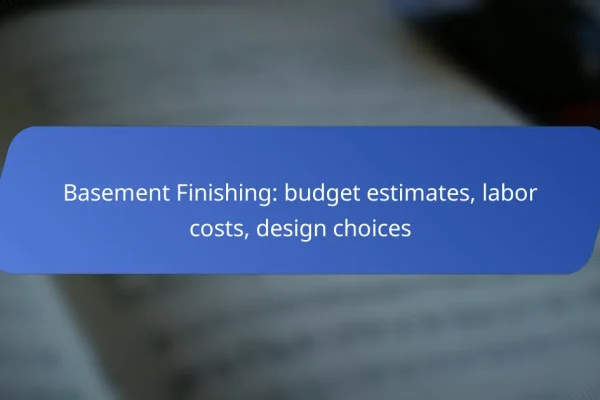What are the average costs of home renovation projects in the UK?
The average costs of home renovation projects in the UK can vary significantly based on the scope and complexity of the work. Generally, homeowners should expect to spend anywhere from a few thousand to tens of thousands of pounds, depending on the specific renovations being undertaken.
Kitchen renovation costs
Kitchen renovations typically range from £5,000 to £30,000, influenced by factors such as the size of the kitchen and the quality of materials used. A basic remodel may involve new cabinets and countertops, while a high-end renovation could include custom designs and premium appliances.
When planning a kitchen renovation, consider the layout and functionality. Open-plan designs are popular but may require structural changes, which can increase costs. Always budget for unexpected expenses, as hidden issues like plumbing or electrical work can arise.
Bathroom renovation costs
Bathroom renovations generally cost between £3,000 and £15,000. The price depends on whether you are doing a simple update or a complete overhaul, including new fixtures, tiles, and possibly reconfiguring the layout.
It’s essential to prioritize quality in bathrooms, as they are high-traffic areas. Consider water-efficient fixtures to save on long-term utility costs. Always check for local regulations regarding plumbing and electrical installations to avoid fines.
Living room renovation costs
Living room renovations can range from £2,000 to £20,000, depending on the extent of the work. Simple updates like painting and new furniture are on the lower end, while extensive remodels involving structural changes or built-in features can push costs higher.
Focus on creating a comfortable and functional space. Consider the flow of the room and how it connects to other areas of the home. Investing in good lighting and quality flooring can enhance the overall appeal and value of your living room.
Bedroom renovation costs
Bedroom renovations typically cost between £2,000 and £15,000. Costs will vary based on whether you are making cosmetic changes or undertaking a full remodel that includes new layouts or built-in storage solutions.
When renovating a bedroom, think about maximizing space and comfort. Built-in wardrobes can save space, while quality materials for flooring and furnishings can improve aesthetics and durability. Always consider your personal style and how it reflects in your choices.
Whole house renovation costs
A whole house renovation can be a significant investment, often ranging from £20,000 to over £100,000. The total cost depends on the size of the home and the extent of renovations needed, including structural changes, new systems, and finishes.
Before starting a whole house renovation, conduct a thorough assessment to identify necessary repairs and upgrades. Create a detailed plan and budget, and consider hiring a project manager to oversee the work. Be prepared for delays and unexpected costs, as comprehensive renovations often reveal hidden issues.
What factors influence home renovation costs?
Home renovation costs are influenced by several key factors, including the size of the project, the quality of materials chosen, regional labor costs, and the complexity of the design. Understanding these elements can help homeowners budget effectively and make informed decisions.
Size of the project
The size of the renovation project significantly impacts overall costs. Larger projects, such as full home remodels or additions, typically require more materials and labor, leading to higher expenses. For instance, a small bathroom update may range from a few thousand dollars, while a complete kitchen overhaul could easily exceed tens of thousands.
When planning, consider breaking down the project into manageable phases. This approach can help control costs and allow for adjustments based on budget constraints.
Quality of materials
The choice of materials can greatly affect renovation costs. High-quality materials, such as premium countertops or custom cabinetry, will increase expenses but may also enhance durability and aesthetics. Conversely, opting for budget-friendly options can reduce costs but might compromise longevity.
It’s advisable to balance quality and budget. Consider mid-range materials that offer a good combination of durability and cost-effectiveness, especially for areas with high wear and tear.
Labour costs in different regions
Labor costs vary significantly across different regions, impacting the total cost of renovations. Urban areas often have higher labor rates compared to rural locations due to demand and cost of living. For example, hiring contractors in cities like New York or San Francisco may cost 20-30% more than in smaller towns.
When budgeting, research local labor rates and consider obtaining multiple quotes from contractors. This can help ensure you receive a fair price for the work needed.
Design complexity
The complexity of the design can also influence renovation costs. Intricate designs that require specialized skills, such as custom millwork or unique architectural features, will typically incur higher labor costs. Simple, straightforward designs are generally more budget-friendly.
To manage costs, aim for a design that meets your needs without unnecessary complexity. Focus on functional layouts and consider standard features that can be more affordable while still achieving a polished look.
How can homeowners budget for renovations?
Homeowners can budget for renovations by assessing their financial situation, estimating project costs, and setting a realistic spending limit. This process involves careful planning and prioritization to ensure funds are allocated effectively across various projects.
Setting a renovation budget
To set a renovation budget, start by determining your total available funds, including savings and potential loans. Consider the costs of materials, labor, permits, and unexpected expenses, which can add up to 10-20% of your initial estimate.
Break down your budget into categories such as kitchen, bathroom, and exterior renovations. This helps in visualizing where your money will go and allows for adjustments if certain areas exceed your expectations.
Prioritizing renovation projects
Prioritizing renovation projects is essential for effective budgeting. Identify which areas of your home need immediate attention, such as safety concerns or structural issues, and rank them based on urgency and impact on your daily life.
Consider the return on investment (ROI) for each project. For example, kitchen and bathroom remodels typically offer higher returns compared to other renovations, making them a priority if resale value is a concern.
Using renovation cost calculators
Renovation cost calculators can provide valuable estimates for your projects. These tools allow homeowners to input specific details about their renovation plans, helping to generate a more accurate budget based on local costs.
Many online calculators offer customizable options for different types of renovations, which can help you compare costs across various projects. However, always cross-reference these estimates with local contractors to ensure accuracy and account for regional price variations.
What financing options are available for home renovations?
Home renovation financing options include home equity loans, personal loans, and government grants or schemes. Each option has distinct features, benefits, and potential drawbacks that homeowners should consider before making a decision.
Home equity loans
Home equity loans allow homeowners to borrow against the equity they have built in their property. Typically, these loans offer lower interest rates compared to personal loans since they are secured by the home. Homeowners can usually borrow up to 80% of their home’s appraised value minus any outstanding mortgage balance.
When considering a home equity loan, it’s essential to evaluate the total cost of borrowing, including closing costs and fees. Additionally, ensure that you can comfortably manage the monthly payments, as failure to repay could lead to foreclosure.
Personal loans
Personal loans are unsecured loans that can be used for home renovations without putting your home at risk. They often have higher interest rates compared to home equity loans, but they can be a good option for smaller projects or for those without significant home equity.
When applying for a personal loan, check your credit score and shop around for the best rates. Many lenders offer quick approval processes, but be mindful of the loan term and monthly payment obligations to avoid financial strain.
Government grants and schemes
Government grants and schemes can provide financial assistance for home renovations, particularly for energy efficiency upgrades or for low-income households. These programs vary by location and may cover a portion of the renovation costs or offer favorable loan terms.
To access these funds, research local and federal programs that may be available. Be prepared to meet specific eligibility criteria and provide documentation of your renovation plans. Utilizing these resources can significantly reduce out-of-pocket expenses for your home improvement projects.
What are common mistakes to avoid during home renovations?
Common mistakes during home renovations can lead to increased costs and project delays. Being aware of these pitfalls can help homeowners navigate their projects more effectively.
Underestimating costs
One of the most frequent errors in home renovations is underestimating costs. Homeowners often overlook expenses such as materials, labor, and unexpected repairs, which can significantly inflate the final budget.
To avoid this mistake, create a detailed budget that includes a contingency fund of around 10-20% of the total estimated costs. This buffer can help manage unforeseen expenses that may arise during the renovation process.
Neglecting permits and regulations
Neglecting to obtain necessary permits and adhere to local regulations can lead to costly fines and project delays. Many renovations, especially structural changes, require permits to ensure compliance with safety standards.
Before starting any renovation, research local building codes and permit requirements. Contact your local municipality to understand what is needed for your specific project, as failing to do so can result in having to redo work or pay penalties.















